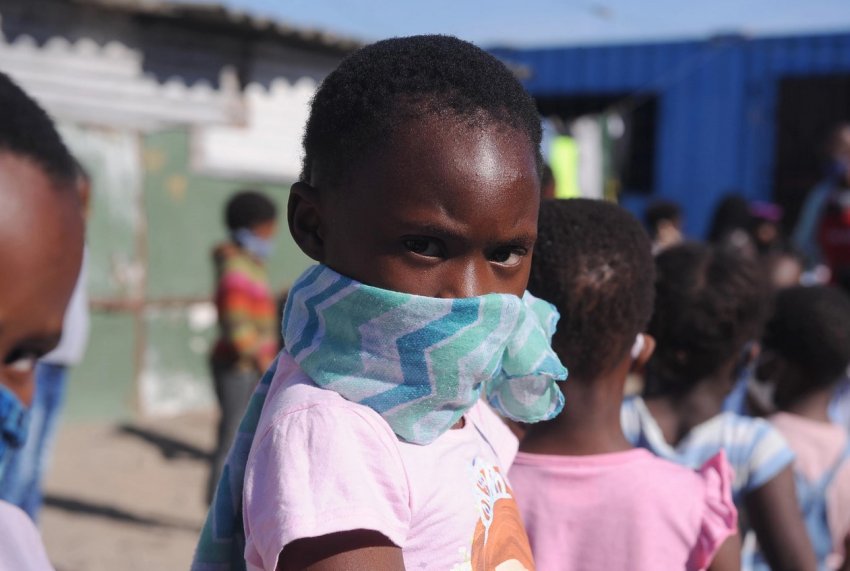
Time of Pandemics
Directed by Rehad Desai
Uhuru Productions, 2022.
90 mins
Time of Pandemics didn’t start out as a film about COVID-19. Back in late 2019, South African film maker Rehad Desai was approached by leading medical researcher, Glenda Gray, to make a film about a revolutionary antibody technology that could lead to a vaccine against HIV/AIDS. But only months into the project, COVID-19 was declared a global pandemic.
“So we’re filming a good news doc, when COVID-19 comes along and upturns all our plans,” says Desai. “Now all the people I’m following are on the frontline of a new pandemic.”
With the pandemic taking hold across Africa, Desai also found himself leading a movement around public health and access to vaccines.
Gray, who now leads the South African Medical Research Council, and Desai (who worked in HIV prevention before becoming a filmmaker) were both active in the campaign for access to treatments in South Africa during the HIV pandemic. Up to 10 million lives were lost.
“Back then hard lessons were learned,” says Desai. “We learnt that fewer people suffer and die where there is strong commitment to public health, and that where there is the political will, everyone can have access to the medicines that they need. We learnt this the hard way, and only after a lot of unnecessary suffering.”
South Africans are suffering greatly from the COVID-19 pandemic. The country’s death toll stands at more than 250,000 when the excess deaths figure calculated by the South African Medical Research Council is added to the “official” figure of 90,000 plus. It is also a country with millions of immune-suppressed people, the result of HIV infection.
The health crisis is compounded by the lack of availability of COVID-19 vaccines. The World Health Organization COVAX scheme is insufficient to meet the needs of poorer countries and rich countries pre-ordered doses of COVID-19 vaccines long before they reached production, grabbing global supplies ahead of low and middle-income countries.
“Thirteen percent of the world’s population had bought up more than half of the potential supply,” says Fatima Hassan, founder of the Health Justice Initiative in South Africa.
South Africa’s government responded to the pandemic, imposing “one of strictest and harshest lockdowns” in the world, according to Gray. This caused untold suffering due to the lack of government support for vulnerable people.
The COVID-19 pandemic is not the first health crisis where South Africans have been left behind in access to treatments. Time of Pandemic looks back at the struggle for access to anti-retroviral drugs to treat HIV/AIDS and at the struggles today for a people’s vaccine against COVID-19.
Today’s struggle also has global implications. The combination of an immune-compromised population, with a lack of access to COVID-19 vaccines is a “perfect storm” for new COVID-19 variants to emerge.
Desai’s film is powerful, educative and places the struggle for medical treatments within the context of the global capitalist political economy, neoliberalism, privatisation of healthcare and the power of Big Pharma.
The film also traces the rise of zoonotic disease outbreaks, like the HIV/AIDS and COVID-19 pandemic, which have crossed from animals to humans due to the destruction of habitat caused by industrial farming and encroachment of human activity into once pristine ecosystems. Evolutionary biologist and author Rob Wallace provides an accessible explanation of this in the film. “Animals that are reservoirs for pathogens are coming right up against agriculture, spilling over into the livestock and from there spreading out onto the global travel network,” says Wallace.
The film features interviews with Dr Anthony Fauci director of the United States National Institute of Allergy and Infectious Diseases and one of the lead members of the White House Coronavirus Task Force during Donald Trump’s presidency, when the pandemic first ravaged the US. Trump’s denial of science and minimisation of the COVID-19 pandemic resulted in untold deaths. The film draws parallels with then-president of South Africa Thabo Mbeki’s denial of the science of HIV/AIDS and his opposition to the use of anti-retroviral drugs.
During the HIV/AIDS pandemic, scientists and health professionals collaborated globally to find treatments and understand the virus. But in the decades since, health and medical research, pharmaceuticals and medical technology has been impacted by the World Trade Organization’s Trade Related Aspects of Intellectual Property Rights (TRIPS) Agreement. TRIPS enforces patents worldwide, allowing for sanctions against countries who do not respect them, and effectively guarantees the profits of Big Pharma and Big Tech.
Desai writes that the TRIPS agreement “is a deeply flawed neoliberal instrument that has stifled innovation and inflicted harm of genocidal proportion on the world’s poor”.
Time of Pandemics is an essential tool for understanding the ways in which capitalism puts profits ahead of human and planetary health and how communities are fighting back to demand access to vaccines and free healthcare.
It celebrates the power of the people’s movement for anti-retroviral therapies and the scientific advances in HIV/AIDS vaccine development and is a powerful motivation to the global movement for a people’s vaccine for COVID-19 and for healthcare to be liberated from the market.
Most importantly, as COVID-19 will not be the last pandemic humanity faces, the film makes a powerful argument for ecosocialist solutions to capitalism’s destructive logic.
[Time of Pandemics has just been released, and is freely available for organisations to utilise.]